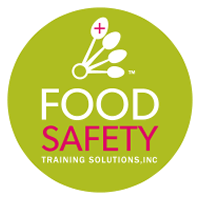By Francine L. Shaw, President
Food Safety Training Solutions, Inc.

Food Safety Training Solutions, Inc.
It seems Donald Trump’s Mar-a-Lago estate could be serving more than its guests’ favorite meals. According to recent Florida Food Service Inspection Reports, inspectors found 13 violations at Donald Trump’s private Palm Beach club. This is a record for a food service establishment that charges $200,000 in initiation fees. One would assume the club could afford to keep the equipment operational, hot water for handwashing, and to purchase their products from approved suppliers – maybe they were, but without proper documentation who knows. Three of Mar-a-Lago’s violations were cited as “high priority”, meaning they could contribute directly to a foodborne illness or injury. That’s significant anywhere, but is especially concerning at the “Southern White House,” which is regularly serving food to the President of the United States, as well as important international dignitaries.
Storing refrigerated food in broken down coolers in an obvious violation. Inspectors found that, in two of the 6 Diamond Award winning establishment’s restaurants, raw meats were being held at concerning temperatures – well above the recommended 41°F – making them potentially dangerous to consume. Chicken was being held at 49°F, duck temped at 50°F, raw beef at 50°F, octopus 50°F and the big kahuna? Ham at 57°F. A multitude of illnesses can result from storing these products at unsafe temperatures, which can easily cause bacteria levels to multiply. The higher the temperature, the faster the bacteria grows to unsafe levels, thus increasing the odds of causing a foodborne illness outbreak.
Fish designed to be served raw or undercooked had not undergone proper parasite destruction, per the inspection report. Was this fish purchased from an approved supplier? If so, where were the parasite destruction tags that reputable suppliers should supply? Eating sashimi, sushi, or ceviche here certainly has the potential to lead to a foodborne illness, based on these food safety inspection results. Getting anisakiasis, a parasite disease contracted from consuming infected seafood which is eaten raw or marinated, does not sound like my idea of a good time. If infected, removal of this parasite may require surgery. Japanese leader Shinzo Abe dined at Mar-a-Lago with President Trump earlier this year; with sushi being a Japanese staple, the Prime Minister is lucky he didn’t become ill.
To make matters worse, food products are being stored on rusted shelving in coolers in Mar-a-Lago’s restaurants, which is also a food safety violation. Our President is a man that reportedly has marble columns, walls and floors, 24K gold accents i.e. platters, lamps, vases and crown molding in his Manhattan penthouse, yet, his exclusive Mar-a-Lago resort can’t afford higher standards than rusted shelving?
Many people don’t think of ice as a food, but it is. Ice machines can be one of the most ignored pieces of equipment in a restaurant. Storing an ice machine outside in the elements, as Mar-a-Lago was found to be doing, exposes the ice to a plethora of contamination, and when the ice is transferred to beverages, the drinks become contaminated, as well. No, alcohol will not kill these bacteria as many assume. Consuming beverages with contaminated ice can cause guests to become very ill.
According to the inspection report, Mar-a-Lago restaurants lacked hot water for handwashing, which is a very concerning violation. Hot water for handwashing is a necessity in any kitchen. If employees can’t/don’t wash their hands effectively, the risk of disease increases immeasurably. Improper handwashing is proven to lead to illnesses including Hepatitis A, E.coli, Norovirus, Nontyphdal Salmonella, Salmonella Typhi, Shigella – all highly contagious and potentially life threatening.
Another violation was lack of hair restraints in Mar-a-Lago kitchens. It is required that hair restraints be worn in a working kitchen for multiple reasons. Many people carry Staphylococcal aureus, this can be transferred when individuals touch their hair, face or body. Not to mention the potential contamination – and the embarrassment! – if a strand of hair falls into Chinese President Xi Jinping’s pan-seared Dover sole fish while he is dining at the “Mar-a-Lago Winter White House”.
The White House in Washington, DC, has had many incredible executive chefs who are properly trained and qualified to prepare food for visiting dignitaries. I am quite certain the temperatures, cleanliness and quality of the equipment in the “real” White House are far superior to that of Mar-a-Lago, based on what I have read in the recent Florida Food Service Inspection Reports. I suggest we avoid the possible mortification of making foreign dignitaries ill and schedule future meetings at the actual White House, 600 Pennsylvania Avenue. What an embarrassment we would be to the world if there was a foodborne illness at Mar-a-Lago while President Trump was hosting an international gathering, and based on these inspections – it’s entirely possible.
 Francine L. Shaw is President of Food Safety Training Solutions, Inc., which offers a robust roster of services, including consulting, food safety training, food safety inspections, norovirus policies for employees, norovirus clean-up procedures, curriculum development, responsible alcohol service training, and more. The Food Safety Training Solutions team has more than 100 combined years of industry experience in restaurants, casinos, and convenience stores. The company has helped numerous clients, including Paradies Lagardère, McDonald’s, Subway, Marriott, Domino’s, Girl Scouts and Boy Scouts of America, Dairy Queen, and Omni Hotel and Resorts, prevent foodborne illnesses. Additionally, they work with restaurants of all sizes, schools, medical facilities, convenience stores, hotels and casinos. Francine has been featured as a food safety expert in numerous media outlets, including the Dr. Oz Show, the Huffington Post, iHeartRadio, Food Safety News, and Food Management Magazine.
Francine L. Shaw is President of Food Safety Training Solutions, Inc., which offers a robust roster of services, including consulting, food safety training, food safety inspections, norovirus policies for employees, norovirus clean-up procedures, curriculum development, responsible alcohol service training, and more. The Food Safety Training Solutions team has more than 100 combined years of industry experience in restaurants, casinos, and convenience stores. The company has helped numerous clients, including Paradies Lagardère, McDonald’s, Subway, Marriott, Domino’s, Girl Scouts and Boy Scouts of America, Dairy Queen, and Omni Hotel and Resorts, prevent foodborne illnesses. Additionally, they work with restaurants of all sizes, schools, medical facilities, convenience stores, hotels and casinos. Francine has been featured as a food safety expert in numerous media outlets, including the Dr. Oz Show, the Huffington Post, iHeartRadio, Food Safety News, and Food Management Magazine.
